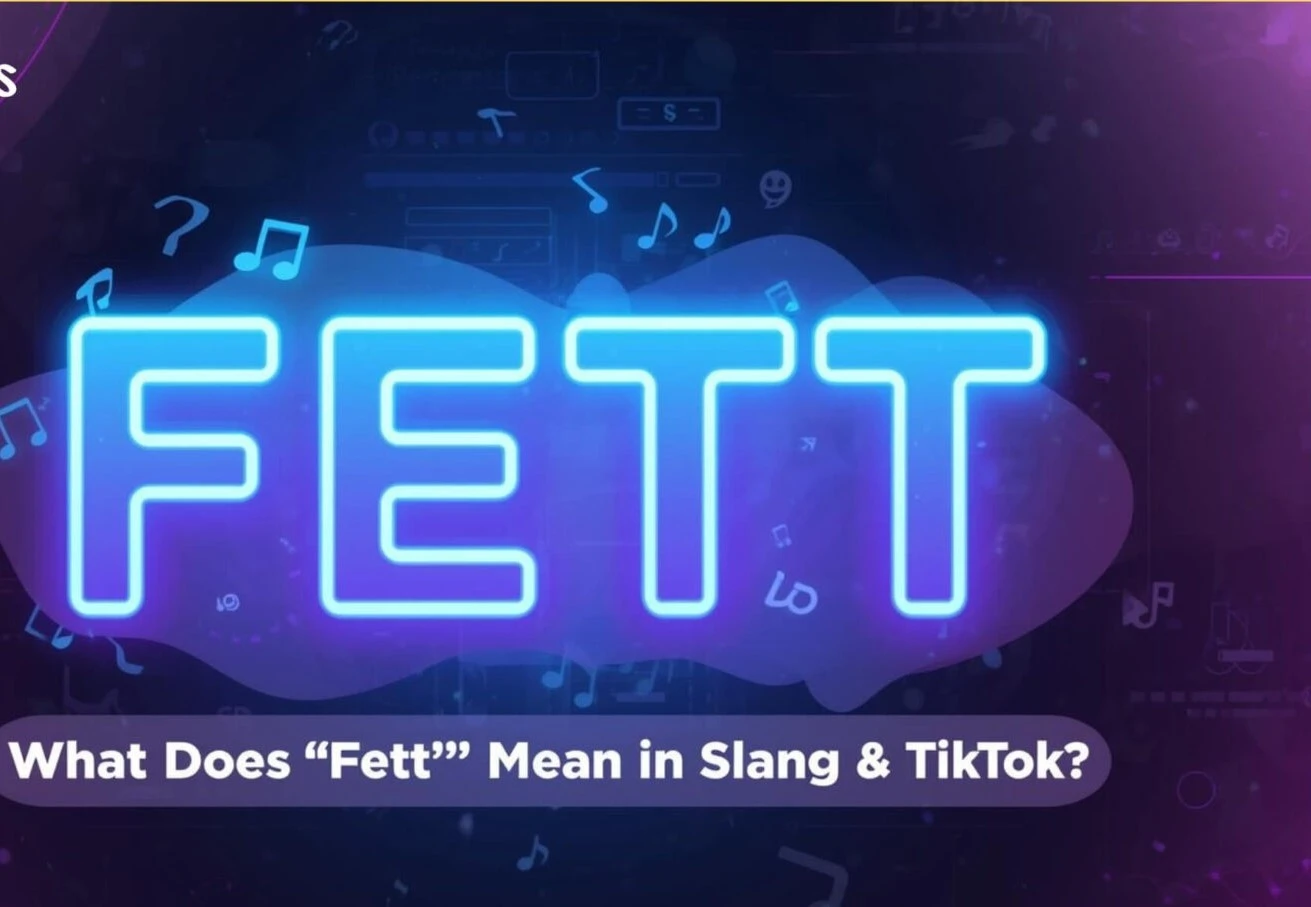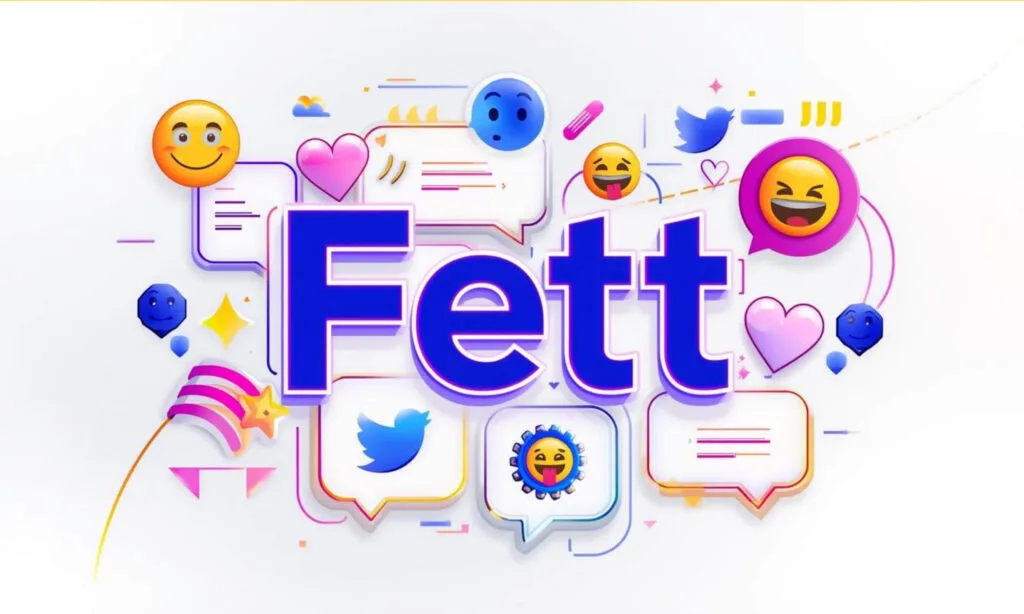Fett Meaning

The word “fat.” It describes food or a body type. But language changes. It twists and turns. Now, a word like this means something cool. Welcome to the world of “fett.”
This guide explores this unique slang. We look at its simple start and its modern splash. The word “fett” is a superstar in youth culture across Europe. Trust me, its journey is a fun ride from the dinner plate to the dance floor.
This term is a perfect example of linguistic evolution. Words can flip their meaning with culture. Understanding “fett” helps you understand modern German, Swedish, and Norwegian talk. It connects old roots with brand-new vibes.

First, the basic fact. In German, Swedish, and Norwegian, “fett” literally means “fat.” It describes greasy food or a physical state. This is its original, dictionary job for centuries.
Now for the slang twist. In modern talk, “fett” means “cool,” “awesome,” or “very.” It describes something impressive. A great song is “fett.” A fun party is “fett.” The word packs a positive punch.
Look at its use across different places. In German slang, you say, “Das Konzert war fett!” (The concert was awesome!). In Swedish, “en fet bil” means a cool car. The word shape-shifts but keeps its cool core.
Table: Fett Meanings Across Languages
| Language | Literal Meaning | Slang Meaning | Example Phrase |
| German | fat | cool, awesome | “Das Spiel ist fett!” |
| Austrian German | fat | great, intense | “Des war a fetta Abend!” |
| Swedish | fat | cool, very | “Det är en fet låt.” |
| Norwegian | fat | excellent, great | “Konserten var fet!” |
The story of “fett” starts very old. Its root is the Proto-Germanic word fettaz. This ancient term meant “fat” or “plump.” All modern versions spring from this old source.
This word evolved through ancient languages. Old High German had “feizit.” Old Norse used “feitr.” Middle High German said “vetz.” All these pointed to fatness or grease. They described substance and richness.
The shift from literal to slang is key. “Fat” meant abundance and wealth. Think of a “fat” wallet or a “fat” piece of meat. This idea of richness slowly turned figurative. Something “fat” became something substantial and good.
Modern youth culture sealed the deal. European hip-hop scenes in the 90s and 2000s loved the word. They used “fett” for impressive beats and styles. This music spread the slang meaning like wildfire.
Let’s say it right. The phonetic spelling is /fɛt/. It sounds just like the English word “fet” or “pet.” The ‘e’ is short and crisp. Forget the double ‘t’; it doesn’t change the sound.
Rhymes help. Think of English words like “met,” “set,” or “bet.” Now put an ‘f’ in front. You get “fett.” It’s a one-syllable, sharp word. It hits the ear and stops.
This short sound is perfect for slang. Slang needs quick, punchy words. “Fett” fits. It’s easy to yell in a crowd or type in a chat. Its simplicity helped its rise to fame.
Slang loves irony. It takes a neutral or bad word and makes it good. “Sick” means great. “Bad” means cool. “Fett” follows this rule. It turned from a plain description to a top compliment.
Cultural ideas of abundance helped. A “fat” harvest means a good harvest. A “fat” sound means a rich, full sound. This idea transferred to anything excellent or intense. Youth culture grabbed this concept.
Hip-hop and rap music were big forces. Artists wanted bold, gritty words. “Fett” sounded strong and street-smart. It described phat beats and cool gear. The music scene made “fett” a symbol of social energy and style.
The slang “fett” is a pan-Germanic superstar. Its use varies slightly by country but the core idea stays. It connects youth from different nations.
In Germany, it’s super common. Teens say “fett” for anything from a new phone to a soccer goal. In Austria and Switzerland, dialect versions like “fetta” or “fett” are equally popular in casual talk.
Sweden and Norway have their own twist. The Swedish “fet” and Norwegian “fet” work the same way. They describe cool things or add emphasis. Like saying “very good.” The digital world erased borders for this word.
Country-by-Country Slang Use
| Country | Primary Language | Slang Usage Context | Common Example |
| Germany | German | Gaming, music, everyday praise | “Fette Leistung!” (Awesome performance!) |
| Austria | Austrian German | Parties, social events, compliments | “Des is fett oida!” |
| Sweden | Swedish | Music, fashion, expressing excitement | “Vad fet mobil!” (What a cool phone!) |
| Norway | Norwegian | General approval, describing fun | “Det var fet!” (That was great!) |
Online culture turbocharged “fett.” Gamers type “fett play!” in chats. Memes use the word for funny effect. On TikTok and Instagram, tags like #fett show cool videos. The internet is its modern home.

Music gave “fett” its big break. The German hip-hop scene of the late 90s is ground zero. Artists like “Fettes Brot” (which means “Fat Bread”) used it right in their name. They made the word cool for a whole generation.
Song lyrics are full of “fett.” Rappers use it to describe their shoes, their cars, their beats. A line might say, “Die Bassline ist einfach fett” (The bassline is just fat). It means the beat is powerful and excellent.
The word jumped from music to all media. German YouTubers call epic game moments “fett.” TikTok clips with crazy tricks get labeled “fett.” It became the go-to word for anything that creates a big reaction. Pop culture made it a staple.
Context is king. Use “fett” for objects, events, or experiences. Compliment a friend’s new skateboard: “Dein Board ist fett!” Describe an intense concert: “Die Show war voll fett!” It shows approval and excitement.
You can use it for intensity. “Das war fett laut!” means “That was very loud!” It acts as an amplifier. In gaming, a “fett” win is a dominant win. The word adds weight to your statement.
Here is a crucial pro tip. Never use “fett” to describe a person’s body. Its literal meaning is still strong and can cause offense. Stick to objects, sounds, events, and situations for safe and cool usage.
Correct Contexts for Using “Fett”
| Context | Example Sentence | Implied Meaning |
| Complimenting an Object | “Dein neues Auto ist fett!” | “Your new car is awesome!” |
| Describing an Event | “Das Festival gestern war fett.” | “The festival yesterday was great.” |
| Gaming Achievement | “Das war ein fettes Goal!” | “That was an amazing goal!” |
| Emphasizing Intensity | “Der Film hatte fette Effekte.” | “The movie had intense effects.” |
If “fett” feels strange, think of English slang. It matches words like “cool,” “awesome,” or “sick.” These words also started with other meanings and became positive.
The closest match is actually “phat.” This American slang also means “cool” and plays on the word “fat.” Just like “fett,” “phat” describes great music and style. They are linguistic cousins.
Other good equivalents are “lit,” “dope,” or “fire.” They all describe something excellent and impressive. The function is identical. You swap “fett” for these in a sentence.
Fett and Its English Cousins
| German Slang “Fett” | English Slang Equivalent | Example in English |
| cool, awesome | cool, awesome | “That trick was awesome!” |
| very, intense | lit, fire | “The party was lit!” |
| impressive, excellent | dope, sick | “Your shoes are dope!” |
| (direct cousin) | phat | “That’s a phat beat.” |
Pre-1900s: The word exists only in its literal sense. It means “fatty” or “greasy” across Germanic languages. It’s about physical description, not opinion.
Early-Mid 1900s: Figurative use begins slowly. Phrases like “fettes Geld” (lots of money) appear. The idea of “fat” meaning “rich” or “abundant” sets the stage.
1980s-1990s: Youth and hip-hop culture discover the word. In Germany and Sweden, it starts meaning “cool.” It’s underground slang in cities and music clubs.
2000s-Present: The internet era explodes. “Fett” spreads through forums, games, and later social media. It becomes mainstream youth slang across Germanic Europe. Its modern meaning solidifies.
Other words in German mean similar things. “Krass” means crazy or awesome. “Geil” is a classic slang for cool or horny. “Stark” means strong, but can mean great too.
Swedish has “grym” (which literally means cruel) for awesome. Norwegian uses “dritkult” (very cool). Each language has its own flavor of slang praise.
Synonyms Across Languages
| Language | Synonym Slang Word | Literal Meaning | Slang Meaning |
| German | krass | crude, harsh | awesome, extreme |
| German | geil | horny, lustful | cool, great |
| Swedish | grym | cruel, brutal | awesome, sick |
| English | sick | ill, unwell | excellent, cool |
The word “fett” is hottest in Central and Northern Europe. Germany is the core. Use spreads thick in cities like Berlin, Hamburg, and Munich. Austria and Switzerland follow close behind.
Head north to Scandinavia. Sweden and Norway use their versions “fet” actively. You hear it in Stockholm and Oslo youth circles. The meaning crosses the Baltic and North Seas easily.
Online, the map is global. Wherever German gamers or K-pop fans meet online, “fett” can pop up. Digital communities keep the word alive and spreading. It’s a tag for cool content worldwide.
So, what is “fett”? It’s a simple word with a double life. Literally, it means fat. As slang, it means the coolest thing. It grew from ancient roots to modern chats.
You hear it in Germany, Austria, Sweden, Norway. It came from old words for fat, helped by hip-hop music. You say it like “fet.” For example, “Das ist fett!”
Remember the key rule. Use it for things, not people’s bodies. Now you understand this piece of modern European youth language. You know its journey and its use.
Language transforms with us. “Fett” shows how a basic word can become a symbol of style. Culture, music, and the internet rewrite meanings every day.
This term thrives in music, gaming, and online talk. It connects people across countries. It adds a punch of excitement to everyday conversation.
Go ahead, use “fett” with confidence. Understand its history and power. You now hold a key to a vibrant piece of modern linguistic culture. Just remember the context, and you will sound perfectly cool.
In modern slang, “fett” means something is cool or awesome. It is a big compliment. You use it for music, games, events, or cool stuff. It is not about weight.
Yes, they are very similar. “Phat” is English slang from “fat.” “Fett” is Germanic slang from “fat.” Both now mean “excellent.” They are like brother words from different languages.
You can, but explain it. If you say, “That game was fett!” your friends might not know. Tell them it’s German for “cool.” It can be fun slang to share between cultures.
Almost always. Today, it is a positive word for something impressive. Just avoid using it about a person’s body. That context can be negative or rude.
Say it like the English word “fet.” It rhymes with “pet” or “met.” It is short and sharp. Just one quick syllable: /fɛt/.